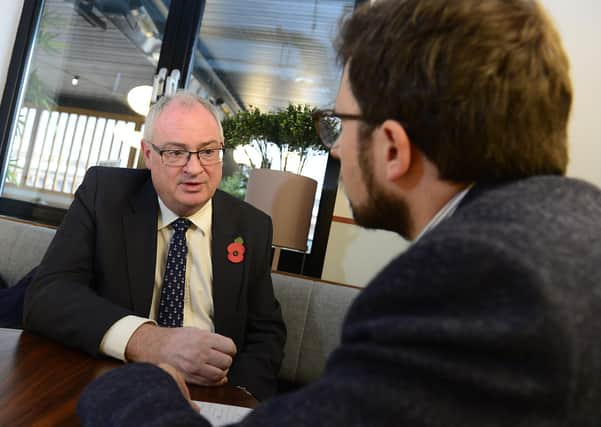Sam McBride: Steve Aiken’s successor will inherit a once-dominant Ulster Unionist Party which is now withered


In October 2019, the Ulster Unionist Party press office issued an unsurprising two-sentence statement. It said that nominations for the leadership had closed and there had only been one nomination – South Antrim MLA Steve Aiken – who would go forward to a party general meeting for ratification.
The news editor suggested I should try to do an interview with the incoming leader and the following day Dr Aiken arrived in the News Letter’s Belfast office.
Advertisement
Hide AdAdvertisement
Hide AdHe was unaccompanied by a press officer, down to earth, and spoke candidly about everything from his fear that there was “institutional corruption” in parts of Stormont to his personal support for liberalising the abortion law.
But those responses were the prelude to a far more problematic comment. When asked if the UUP would stand aside for the DUP in some seats in elections, Mr Aiken bluntly and emphatically said: “No. We’re not standing aside. We’re going to fight all 18 constituencies.”
It was perhaps the most obvious question asked in the interview and so I took his comment to be bold, but calculated. Later, after he had been photographed outside the office, I asked if I could turn on the recorder again to be utterly clear about what he had said. He agreed, and was categorically explicit about the policy.
There was an immediate and predictable backlash from the DUP, from some other unionists and from some loyalist paramilitaries.
Advertisement
Hide AdAdvertisement
Hide AdWithin days, the policy had been abandoned. Was it a deliberately bold policy which the incoming leader was too weak to enforce, or was it that this relatively inexperienced politician did not comprehend the significance of that issue for unionism?
That has never been fully explained, but the lack of experience in UUP leaders over recent years – particularly Mike Nesbitt and Dr Aiken – has often undermined them. Both men are intellectually capable, but for someone to begin as an MLA in 2016 and find themselves leader of their party three-and-a-half years later, as happened Dr Aiken, is an almost impossible task.
It would be unreasonable to expect anyone to edit a major newspaper three years after starting in journalism, manage a top football team three years after entering the sport, or become a consultant doctor three years after studying medicine.
It is important for politics to attract those with experience beyond politics, but it is also important to give them time to learn the role.
Advertisement
Hide AdAdvertisement
Hide AdAn increasingly desperate UUP has been unable to do that – to its own detriment, as well as to those on whom leadership has been bestowed.
Dr Aiken’s most consequential decision was to enter the Executive last January when many in the party wanted to go into opposition. Robin Swann’s performance as health minister has made him Stormont’s most popular minister. But the fact that his popularity has not translated into support for the UUP shows how hard it is for a minor Executive party to win.
After a year-and-a-half of leadership which failed to inspire, a month ago, Dr Aiken fell apart during a disastrous interview with Stephen Nolan, causing alarm among many of those who had backed him for the top job but whose own jobs are on the line in next May’s Assembly election.
Dr Aiken’s successor is likely to be Doug Beattie, another former military man. Although he has also only been an MLA since 2016, the Military Cross winner had been a councillor two years previously, meaning that he has had seven years in politics. As a working-class man who fought his way – quite literally – to the top based on talent and desire, Mr Beattie would offer the UUP the hope that rather than maintaining its current trajectory to certain death, there is at least the hope of a swashbuckling final stand.
But in Northern Ireland’s centennial year the party which built Northern Ireland has never been weaker.